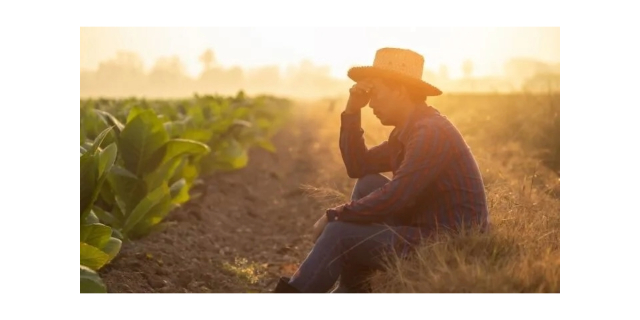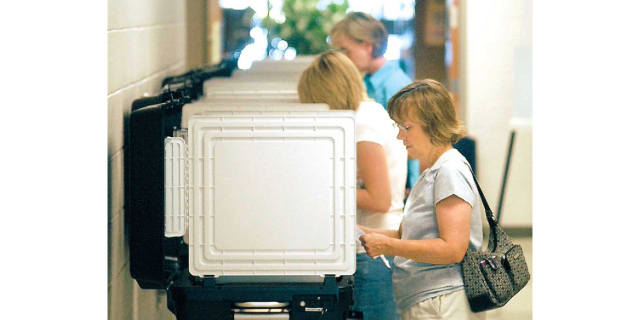Special Report: Protect your body and mind from extreme heat in Georgia
Published 8:30 am Friday, July 25, 2025


Editor’s Note: The National Weather Service has issued a Hazardous Weather Outlook for the local area for the next seven days, warning that heat index values are expected to rise above 100 degrees Friday through Wednesday, with the potential for heat index values as high as 105 to 110 Sunday through Wednesday.
Heat stress on the farm
With heat index values reaching dangerous levels, Georgia farmers and landscape professionals face increased risk of heat-related illness. UGA Extension specialists urge both workers and supervisors to prioritize hydration, rest and mental well-being — and to watch for signs of physical and emotional heat stress.
Trending
When outdoor temperatures climb into triple digits and the humidity becomes suffocating, most people head inside. But for Georgia’s farmers, farmworkers and landscape professionals, the work doesn’t stop when the heat index rises to dangerous levels.
As the hottest weeks of the year stretch ahead, the physical, mental and emotional risks of working outdoors increase. Extreme heat doesn’t just threaten crops, turfgrass and livestock — it wears down the people who grow our food and maintain our green spaces.
To help agricultural and green industry workers prepare for and manage extreme heat, three University of Georgia Cooperative Extension specialists are raising awareness: Pam Knox, agricultural climatologist; Rolando Orellana, urban water management agent focused on the landscape and ornamental industry; and Anna Scheyett, rural stress and behavioral health specialist.
Heat index, not just temperature, drives danger
When it comes to heat advisories, temperature is only part of the equation.
“Temperature measures how hot the air is. But heat index tells us how hot it feels to the human body, which is a more accurate measure of heat stress, especially in Georgia’s humid climate,” said Knox.
Trending
The heat index combines air temperature and relative humidity. High humidity makes it harder for the body to cool itself by evaporating sweat. Even if the temperature doesn’t change, the air can feel much hotter when humidity is high, pushing the body closer to dangerous conditions.
That’s why the National Weather Service issues heat alerts based on the heat index, and why monitoring both temperature and humidity is essential for anyone working outdoors.
More heat, less recovery time
Georgia’s weather may be famously unpredictable, but long-term trends show a steady increase in average temperatures and longer stretches of hot, humid days. Knox, who monitors weather trends across the state, says overnight temperatures are rising too, giving people, plants and animals less time to recover.
“We’re seeing more days above 90 degrees (Fahrenheit) and more nights that don’t cool off,” she said. “When humidity stays high, the body — and livestock — can’t cool down. It just doesn’t let up.”
This adds to the strain of outdoor labor, making it more taxing. But in farming and landscaping, there’s often little room in the schedule to slow down.
Extreme heat increases physical and mental risk
Orellana works closely with Georgia’s landscape and green industry workers, who often spend long hours in full sun.
“Hotter temperatures increase discomfort, but they also increase other risks like heat rash, dehydration and heatstroke,” he said. “Dehydration doesn’t just slow you down. It can kill you.”
And heat stress isn’t just physical, it impairs decision-making and mental clarity. “Heat dulls your cognition,” said Scheyett. “You’re not as alert, you don’t make the best decisions. And farming is already a dangerous job, so that mental fog just makes it worse.”
She encourages farmers to consider clear thinking as a safety tool. “Mental clarity is the new competitive edge,” she said. “It can prevent costly mistakes and accidents.”
She said the ripple effects of heat can stretch beyond the field.
“When the heat drags on, everyone in your household or crew is affected,” Scheyett added. “Nobody sleeps well, everyone’s on edge. It takes a toll emotionally as well.”
Supervisors and farm owners often shoulder added pressure as they monitor the well-being of employees, livestock and crops. “You’re not just farming,” she said. “You’re constantly managing risk — checking on your team, your animals, your equipment. That hypervigilance adds another layer of mental strain.”
Simple strategies that save lives
Scheyett, Knox and Orellana all emphasize the same point: Prevention matters.
One of the most effective tools is the buddy system.
“You need someone watching your back,” Orellana said. “If you start to overheat or collapse, your partner can help move you to shade or call for help. Working alone in this heat is especially dangerous.”
Additional heat safety tips
• Wear light-colored, breathable clothing, and consider sun-protective gear with built-in SPF.
• Use wide-brimmed hats to shield your face, ears and neck from direct sun exposure.
• If possible, schedule physically demanding tasks for early morning hours when temperatures are lower and workers are more alert.
• Take more frequent breaks in shaded or cooler areas to allow the body to recover.
• Stay hydrated by drinking plenty of fluids; consider electrolyte-rich drinks to replenish what’s lost through sweat.
• Supervisors should take five minutes at the start of each shift to review heat safety protocols with their teams.
“Heat safety education shouldn’t wait until someone’s in trouble,” Orellana said. “These are life-and-death issues.”
Knox added, “The best thing you can do is plan ahead. Use forecasts, track the heat index and adjust your schedule when conditions are risky.”
“There’s this belief that stopping is weakness. It’s not — it’s smart,” Scheyett said. “You’re protecting your team, your business and yourself when you manage risk wisely.”
Warning signs to watch for
When it is hot outside, look out for the following physical symptoms of heat-related illness:
• Dizziness or disorientation
• Heavy sweating or sudden lack of sweating
• Rapid heartbeat
• Slurred speech
• Nausea or vomiting
• Muscle cramps
• Cool, pale, clammy skin
• Alternatively, red, hot or dry skin
• Fatigue or fainting
Also consider the mental and emotional warning signs:
• Irritability or anger
• Trouble focusing or making decisions
• Withdrawing from others
• Feeling mentally foggy or overwhelmed
• Hopelessness or emotional numbness
If someone shows these or other signs of heatstroke or mental distress, stop work immediately and move them to a cool, shaded area. Help them lie down, offer fluids to keep them hydrated, and provide calm, supportive conversation while they rest. Do not allow them to return to work until they’ve fully recovered, and seek medical attention if symptoms persist or worsen.
Call or text 988 for free, confidential mental health support, 24/7. Assistance is available in multiple languages, as well as services for individuals who are deaf or hard of hearing.
Check in on others and yourself
In the rush of the season, it’s easy to overlook signs of stress in yourself or those around you. But early recognition can prevent serious outcomes.
“If someone’s acting differently — not talking as much, more irritable, not thinking clearly — those can be signs of heat strain or emotional exhaustion,” said Scheyett. “It’s not always the obvious stuff.”
She encourages informal check-ins between farmers, landscapers and their crews.
“You don’t always have to ask, ‘How are you doing?’” she said. “Sometimes it’s easier to ask, ‘How’s your crew holding up?’ or ‘How’s your son managing out in the field?’ It opens the door for more honest conversation.”
Resources for heat safety and mental health
“Don’t wait until it’s a crisis,” said Scheyett. “The heat affects everyone. Even the farmer who looks like they’ve got it all together is probably struggling too.”
For local resources and support, find your UGA Extension county office, and visit the Rural Georgia: Growing Stronger website. Other resources include:
988: Call or text the 24/7 national crisis and mental health line.
Southeastern Coastal Center for Agricultural Health and Safety: Free tools for agricultural workers throughout the Southeast.
OSHA: Industry-specific heat safety guidance and compliance tools.
As Georgia pushes through its hottest weeks, UGA Extension experts urge those working in agriculture and landscaping to protect their most important asset: themselves.
Emily Cabrera is a writer for the College of Agricultural and Environmental Sciences at the University of Georgia.







